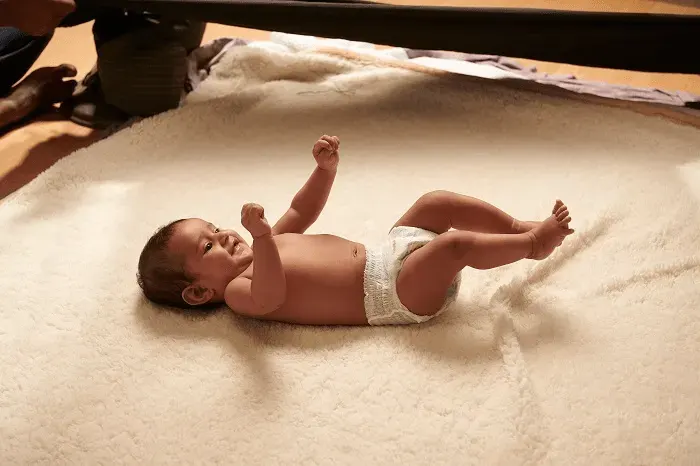Effective Treatments and Home Remedies For Diaper Rash
Whether you're a first-time parent working out the diaper dynamics or have been doing this for what feels like an eternity, newborn diaper rash is probably a part of your parenting landscape that you would rather do without. It sneaks in like glitter after craft time—pesky, persistent, and seemingly everywhere. But worry no more! In this blog, we will discover everything about newborn diaper rash from common causes to diaper rash treatment. Read this article to the end to learn about home remedies for diaper rash that will leave you and your baby cheerfully waving goodbye to this most uninvited of party crashers!
Diaper Rash Causes
There are a few common causes of baby diaper rashes and they are certainly very easy to spot. Friction, skin infections, irritation through excrement, and even allergies are known to cause diaper rashes in newborn babies. Although they cannot always be completely avoided, diaper rash treatment at home is very easy to carry out.

There are a few common causes of baby diaper rashes and they are certainly very easy to spot. Friction, skin infections, irritation through excrement, and even allergies are known to cause diaper rashes in newborn babies. Although they cannot always be completely avoided, diaper rash treatment at home is very easy to carry out.
1. Friction
There are a lot of kinds of friction that can cause diaper rashes in babies. Even the most slightly aggressive diaper-changing technique, a diaper that is a little too tight or possibly chafing can cause diaper rashes.
A constant friction between the diaper and the baby’s skin can develop into a rash, and must always be tended to. Make sure the baby’s diaper changing routine is carried out gently with only the best materials such as alcohol-free baby wipes, and most of all, a soft and super absorbent diaper. This alleviates any friction on their soft skin and reduces the chances of baby diaper rashes.
2. Skin Infection
Baby diaper rashes due to skin infection can be of two kinds; bacterial or fungal and can both be detrimental to the baby’s health. In such cases, you must seek the help of a paediatrician immediately instead of opting for natural remedies for diaper rashes.
Skin infections occur mainly due to contact with urine or faecal matter for prolonged periods of time. This is why diapers must always be inspected and changed from time to time. Not only do prolonged contact with urine and faeces increase the possibility of a bacterial or fungal skin infection, they are also skin irritants that can cause common baby diaper rashes.
3. Allergies
Babies have sensitive skin, far more sensitive than adults or even young children, and they can be sensitive to a variety of substances. Detergent, fragrant and/or alcohol-based baby wipes, lotions and even powders react differently with all babies’ skin.
Avoid using products that are not baby-friendly and have been known to be incompatible with their skin. If you still spot any signs of diaper rashes, stay on the lookout for an allergic reaction to the type of products mentioned above.
4. Tight Diapers
Not only do tight diapers generate friction to cause rashes, they also tend to create an environment that allows bacteria/fungus to fester in the soiled diapers. Always ensure that your baby’s diapers are snug, but not too tight. You must also always make sure that your baby does not spend too much time in a soiled diaper.
Diapers should be inspected and changed periodically, with a comprehensive understanding on when it is okay to change your baby’s diaper. It is also important to pick the right size of diapers for your ever-growing babies. Follow our list of instructions on choosing the right diaper size for your baby to avoid any such instances and mishaps.
5. Poor Diet
For newborn children, there is no better nourishment and nutrition than breastmilk. For toddlers that are being weaned off breast milk, pay close attention to foods that aggravate the sensitivity of your baby’s skin making it susceptible to diaper rashes. Here’s all you need to know about breastfeeding your baby.
Fatty and sugary foods are the ones to avoid if your baby is suffering from diaper rash, or has been known to suffer from it repeatedly.
These are the major and most common causes of baby diaper rashes. Now let us move on to understand the simple and helpful home remedies for diaper rash in babies that can help a parent breathe easy and rest assured.
How To Prevent Diaper Rash In Newborn Babies & Toddlers
In addition to vigilantly changing diapers for your baby, and ensuring they don’t spend too much time in soiled diapers, these are the tips and instructions you must follow in order to treat any mild cases of diapers rashes at home.
Use ointments and jellies such as Vaseline, or other special creams that are made for the baby’s sensitive skin. This is one of the most important home remedies for baby rash that you can practice. Apply a thin layer of these before every diaper change to minimize any friction.
Always ensure cleaning and washing your baby’s cloth diapers with mild detergent. Rinse them thoroughly, at least 2-3 times to ensure there is no leftover detergent in them. Using disposable diapers such as Pampers Premium Care diapers ensures maximum hygiene and exceptional skin comfort for your baby.
Give your baby a few hours a day to go diaper-free. This allows their skin to breathe and remain dry without being in contact with any sort of fabric, facilitating self-healing. Always avoid dressing your baby in tight clothes that retain heat and restrict their skin from breathing such as clothes made of synthetic materials, rubber and plastic.
Avoid rubbing your baby’s skin to dry it and always pat it dry. Rubbing leads to friction and can cause or even worsen diaper rashes.
Make sure you bathe your baby with warm water, using an unscented, mild and baby-friendly soap.
Home Remedies for Diaper Rash

Home Remedies For Diaper Rash
Here are some home remedies that could ease and heal diaper rash in babies.
1. Coconut Oil:
Coconut oil works as a natural moisturiser that has antimicrobial properties. Gently rub it into the affected area in thin layers so that it helps form a protective barrier to soothe irritation.
2. Breast Milk:
If you are breastfeeding, a few drops of breast milk may be applied to the rash because of its natural antibodies and healing properties. Let the milk dry in the air before putting on a new diaper.
3. Oatmeal Baths:
Add finely ground oatmeal to your baby's bath to soothe inflamed skin. The oatmeal has anti-inflammatory properties that can help reduce discomfort from the rash.
4. Shea Butter:
Shea butter is full of fats which would help nourish and care for the skin. Applying a small amount to the rash can help soothe inflammation and promote healing.
5. Plain Yogurt:
Unsweetened, unflavoured yoghurt can be applied directly to the rash in order to act as a natural probiotic. Applying yoghurt is colling on the skin that helps soothe irritation; possibly balancing the moisture of the skin as well.
6. Diaper-Free Time:
Let your baby go without diapers for some time. Exposure to fresh air dries up the area quickly, thereby accelerating healing.
What Diaper Rash Home Remedies Should You Avoid?
While some home remedies for diaper rash can be effective, certain treatments require caution or should be avoided. Not every remedy is suitable for all babies, and some may even exacerbate the rash. Here are a few treatments to use carefully or avoid:
1. Baking Soda
Baking soda is sometimes recommended for diaper rash due to its drying effects. However, applying it directly to your baby's skin can disrupt their natural pH balance, potentially leading to more irritation. Always consult your child's healthcare provider before trying any home remedy.
2. Witch Hazel & Apple Cider Vinegar
Often suggested online, remedies like witch hazel and apple cider vinegar may be harmful to your baby’s sensitive skin. Being acidic, they can irritate the skin rather than soothing it. Exercise caution and carefully consider what you apply to avoid further irritation or infection.
3. Aloe Vera
Pure aloe vera can be soothing, but many store-bought products contain additives that might irritate your baby's skin. If you opt to use aloe vera, ensure it is in its purest form and is free of added chemicals or fragrances that could worsen the rash. Always consult with your baby's healthcare provider before proceeding.
When To Contact Your Healthcare Provider?
While most diaper rashes are treatable at home, there are some situations where consulting a healthcare provider is necessary. If the rash persists and worsens after a couple of days, it is sensible to consult a healthcare provider. Severe rashes with blisters, sores or pus-filled bumps may indicate a bacterial infection which needs medical attention.
Additionally, if your baby develops a fever or exhibits unusual behaviour, such as fussiness or lethargy, seeking medical advice is important. Bright red rashes with small bumps might signify a yeast infection, requiring antifungal treatment. It is crucial not to rely on home remedies for baby rashes that are severe and to consult your baby’s healthcare provider for appropriate care. Timely medical attention ensures your baby receives the necessary treatment and relief from discomfort.
Summary
Newborn diaper rashes are common but thankfully, with the right home remedies for diaper rash, they can be treated effectively. These natural and expert-validated tips will ensure that your baby’s bottom remains rash-free and hygienic. However, if you notice any unusual marks or persistent rashes on the baby’s skin, it is important to consult your baby’s doctor about it.
FAQs
Diaper rash can stem from numerous reasons like prolonged moisture, friction, fabric sensitivity, infection or dietary changes.


